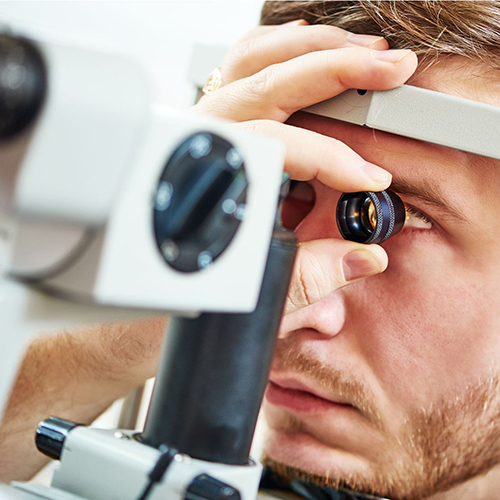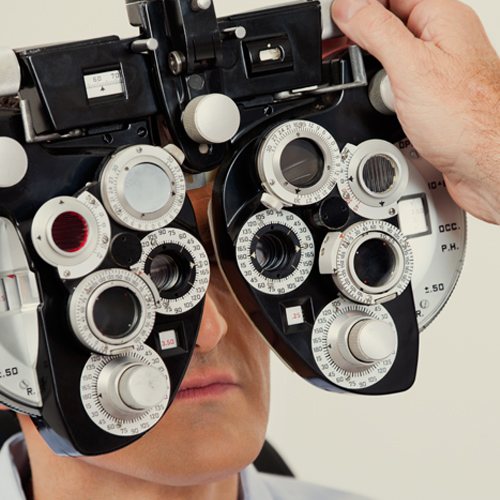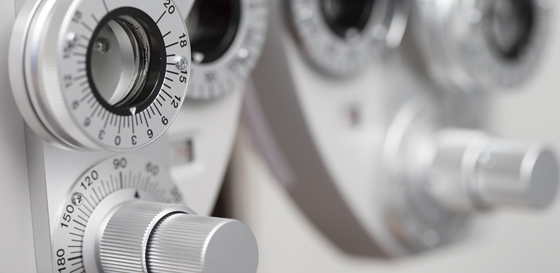Choosing An Eye Care Professional
Ophthalmologist, Optometrist, and Optician: These three eye care professionals often work together and collaborate in your ocular health but training and expertise distinguish each profession.
Collaboration of Care
The three “Os”, ophthalmologist, optometrist, and optician, often work together in your ocular health. For example, you may go to your optometrist for a regular eye exam and vision correction. Your optometrist checks the overall health of your eyes and determines if you need glasses or contacts. You would then see an optician who fits you for contacts or glasses with the refraction (prescription) determined by your eye doctor. Should your optometrist find something concerning in your regular eye exam, he or she may refer you to an ophthalmologist or subspecialist for complex treatment or surgery.
Of all the senses, sight must be the most delightful.
-Helen KellerCollaboration of Care
The three “Os”, ophthalmologist, optometrist, and optician, often work together in your ocular health. For example, you may go to your optometrist for a regular eye exam and vision correction. Your optometrist checks the overall health of your eyes and determines if you need glasses or contacts. You would then see an optician who fits you for contacts or glasses with the refraction (prescription) determined by your eye doctor. Should your optometrist find something concerning in your regular eye exam, he or she may refer you to an ophthalmologist or subspecialist for complex treatment or surgery.

OPHTHALMOLOGIST
An ophthalmologist, often referred to as an “eye MD,” is either a medical doctor (MD) or osteopathic doctor (DO) who specializes in eye disease, treatment, and surgery. An ophthalmologist is an eye doctor with extensive training including a college degree and at least eight years of medical training. The medical training involves four years in medical school, a year internship in general medicine, and an additional three years in a university and hospital-based ophthalmic residency program. Ophthalmologists are physicians and can diagnose and treat more complex eye diseases and perform surgery. General ophthalmologists may prescribe and fit glasses and contact lenses, diagnose and treat all eye diseases, and perform surgical procedures such as cataract surgery. Some surgeons choose to pursue additional, more specialized education through a fellowship distinguishing himself or herself as a subspecialist.
Subspecialists
While ophthalmologists are trained in all aspects of eye care, a subspecialist treats more specific or complex conditions in certain parts of the eye or in certain types of patients. A subspecialist has completed an additional one to two years of in-depth training through a fellowship in a specific area of ophthalmology such as retinal, corneal, glaucoma, neurology, or plastic surgery. Your eye doctor may refer you to a specialist for treatment of more complex conditions such as diabetic retinopathy, macular degeneration, or macular edema. You may also require a specialist for surgery such as a retinal detachment or corneal transplant.

Optometrist
An optometrist is an eye doctor who provides primary vision care. Optometrists earn a Doctor of Optometry (OD) degree which consists of a college degree and an additional four years of optometry school. They diagnose, treat, and manage vision changes, prescribe glasses and contacts, prescribe eye medications, and monitor your overall eye health. An optometrist can detect eye disease which often indicates specialized treatment by an ophthalmologist or subspecialist. In this instance, he or she will refer you to an ophthalmologist for treatment or surgery and may participate in your pre- and post-operative care.
Co-Management of Care
In many cases, an optometrist and ophthalmologist may work as a team to provide care for a specific eye condition. This arrangement is called co-management. Eye Care Specialists works with numerous optometrists in the tri-state area for enhanced patient care. For example, your eye doctor may refer you to one of our cataract surgeons for cataract surgery. After surgery, you return to your optometrist for post-operative care and he or she reports your progress back to your surgeon. Your regular eye doctor remains an important part of your eye care when seeing one of our physicians.

Optician
An optician is a technician who handles the fitting of your vision correction in accordance with the prescription and recommendation provided by your optometrist. The optician helps decide which type of lenses, frames, or contacts will work best. He or she takes facial measurements, provides patient education for contact lens hygiene, adjusts and repairs glasses frames, and often places the product orders. Optician training and certification requirements vary from state to state. Missouri and Illinois do not require extensive formal training. Kentucky does require opticians to be certified by the American Board of Opticianry (ABO) and National Contact Lens Examiners (NCLE). This certification involves a two-year Associates Degree or an Apprenticeship post high school.
An Alternative to Glasses and Contacts
If you struggle with finding a comfortable pair of glasses or can’t find contacts your eyes will tolerate, you should consider iLASIK by corneal and refractive specialist, Dr. Shawn Parker. The iLASIK procedure, ends your dependence on glasses and contacts and offers a safe, hassle-free lifestyle. When proper hygiene is not practiced with contact lenses, you put yourself at risk of serious eye infections making iLASIK a safer choice! Click here to learn more about the benefits of iLASIK or schedule your free consultation with Dr. Parker.
Of all the senses, sight must be the most delightful.
-Helen Keller
OPHTHALMOLOGIST

Ophthalmologist
An ophthalmologist, often referred to as an “eye MD,” is either a medical doctor (MD) or osteopathic doctor (DO) who specializes in eye disease, treatment, and surgery. An ophthalmologist has extensive training including a college degree and at least eight years of medical training. The medical training involves four years in medical school, a year internship in general medicine, and an additional three years in a university and hospital-based ophthalmic residency program. Ophthalmologists are physicians and can diagnose and treat more complex eye diseases and perform surgery. General ophthalmologists may prescribe and fit glasses and contact lenses, diagnose and treat all eye diseases, and perform surgical procedures such as cataract surgery. Some surgeons choose to pursue additional, more specialized education through a fellowship distinguishing himself or herself as a subspecialist
Subspecialists
While ophthalmologists are trained in all aspects of eye care, a subspecialist treats more specific or complex conditions in certain parts of the eye or in certain types of patients. A subspecialist has completed an additional one to two years of in-depth training through a fellowship in a specific area of ophthalmology such as retinal, corneal, glaucoma, neurology, or plastic surgery. Your eye doctor may refer you to a specialist for treatment of more complex conditions such as diabetic retinopathy, macular degeneration, or macular edema. You may also require a specialist for surgery such as a retinal repair or detachment or corneal transplant.

OPTOMETRIST

Optometrist
An optometrist is an eye doctor who provides primary vision care. Optometrists earn a Doctor of Optometry (OD) degree which consists of a college degree and an additional four years of optometry school. They diagnose, treat, and manage vision changes, prescribe glasses and contacts, prescribe eye medications, and monitor your overall eye health. An optometrist can detect eye disease which often indicates specialized treatment by an ophthalmologist or subspecialist. In this instance, he or she will refer you to an ophthalmologist for treatment or surgery and may participate in your pre- and post-operative care.
Co-Management of Care
In many cases, an optometrist and ophthalmologist may work as a team to provide care for a specific eye condition. This arrangement is called co-management. Eye Care Specialists works with numerous optometrists in the tri-state area for enhanced patient care. For example, your eye doctor may refer you to one of our cataract surgeons for cataract surgery. After surgery, you return to your optometrist for post-operative care and he or she reports your progress back to your surgeon. Your regular eye doctor remains an important part of your eye care when seeing one of our physicians.

OPTICIAN

Optician
An optician is a technician who handles the fitting of your vision correction in accordance with the prescription and recommendation provided by your eye doctor. The optician helps decide which type of lenses, frames, or contacts will work best. He or she takes facial measurements, provides patient education for contact lens hygiene, adjusts and repairs glasses frames, and often places the product orders. Optician training and certification requirements vary from state to state. Missouri and Illinois do not require extensive formal training. Kentucky does require opticians to be certified by the American Board of Opticianry (ABO) and National Contact Lens Examiners (NCLE). This certification involves a two-year Associates Degree or an Apprenticeship post-high school.
An Alternative to Glasses and Contacts
If you struggle with finding a comfortable pair of glasses or can’t find contacts your eyes will tolerate, you should consider iLASIK at Eye Care Specialists as an option. The iLASIK procedure, by corneal and refractive specialist Dr. Shawn Parker, ends your dependence on glasses and contacts and offers a safe, hassle-free lifestyle. When proper hygiene is not practiced with contact lenses, you put yourself at risk of serious eye infections making iLASIK a safer choice! Click here to learn more about the benefits of iLASIK or schedule your free consultation with Dr. Parker.
Written By: Kimberley Bader, Patient Education Coordinator
Last Updated: January 26, 2020
![]()
